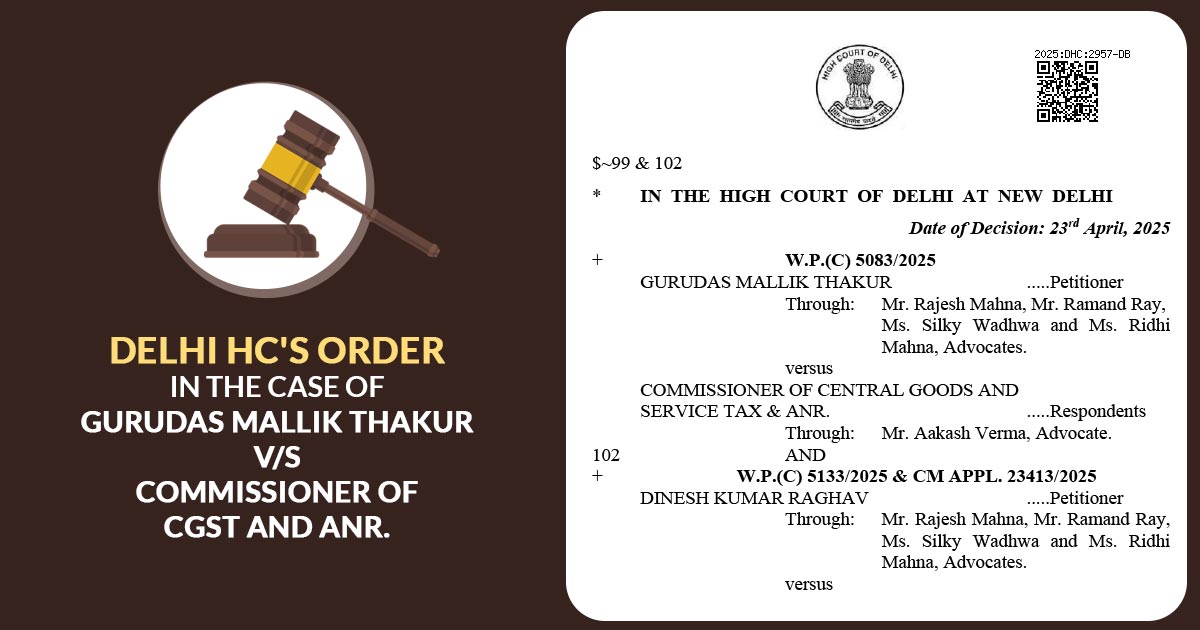
The Delhi High Court has decided that anyone, whether they need to pay taxes or not, can face penalties for avoiding the Goods and Services Tax (GST) under section 122(1A) of the Central Goods and Services Tax Act from 2017.
A division bench of Justices Rajneesh Kumar Gupta and Prathiba M. Singh varied from the decision of the Bombay High Court in Amit Manilal Haria V. The Joint Commissioner of CGST & CE & Ors. (2025), which ruled that Section 122(1A) cannot be invoked against an employee as he is a non-taxable person.
The bench said that, “The purpose of Section 122(1A) of the CGST Act is clearly to make persons who may be responsible for having created bogus invoices and having utilised ITC without the receipt of goods and services and for distributing ITC in contravention of Section 20 of the CGST Act. It can be seen that the manner in which companies function is that there is a management who would be taking decisions on behalf of taxable persons. These companies being inanimate, the responsibility has, by the wisdom of the legislature, been fixed under Section 122(1A) of the CGST Act upon any person who retains the benefits of a transaction.”
The action comes in a petition submitted via two former directors of a company that is in the business of manpower recruitment, being investigated for GST evasion.
The case of the CGST Department, a short payment of GST to the tune of Rs. 40,61,37,843/- by the company, was liable to be recovered under section 74. Thereafter, the adjudicating authority passed the impugned order asking for the demand on the company and its directors, i.e., the Petitioners.
The Petitioners said that they had resigned from the company in 2020 and are not imposed to tax under Section 122 or 122(1A) of the CGST Act and, thus, no liability can be fastened on them. Reliance was placed on Amit Manilal Haria (supra).
The Petitioners are active directors in the company, and in any case, the language used in Section 122(1A) is ‘any person’ and not ‘taxable person’, the department claimed.
They also relied on Bharat Parihar V. State of Maharashtra (2023), where the Bombay High Court ruled that the phrase ‘any person’ shall include a non-taxable person.
Read Also:- Delhi HC Orders Unblocking of GST Credit Ledger After One-Year Lapse, Cites Rule 86A
HC noted that the Bombay High Court in Amit Manilal Haria (supra) had passed solely an interim order. The case was distinct factually since a clear finding is there to the effect that the applicant therein was an employee of the company and not a director who may have taken any advantage.
It said that, “Clearly, there is no doubt that the Petitioners were directors of the company. The exact role that the Petitioners played in the said company, the control and management that the Petitioners exercised as also whether they derived any benefit would be a question that would have to be factually ascertained…The statements which have been recorded by the directors i.e., the Petitioners show that each of them is trying to shrug off their responsibility. In the opinion of this Court, the matter requires closer scrutiny on facts by the Appellate Authority as to who was responsible for running the company and who was taking decisions including relating to generation of invoices, making payments, etc.”
Concerning where the penalty is imposed on anyone u/s 122 and 122(1A) of the CGST Act, the court, a perusal of the definition of ‘any person’ u/s 2(84) of the CGST Act would indicate that it contains an individual without any limitations.
Read Also:- Meaning of SGST, IGST, CGST with Input Tax Credit Adjustment
It ruled, “The question as to which person has retained the benefit and who has not would again be a factual issue. Directors of a company and others who manage such companies owe a responsibility to ensure that companies do not engage in such fraudulent activity for availment of ITC without actual supply of goods, distribution of ITC to persons who have raised fake invoices and non-filing of GST returns. Such activities would have a greater financial impact on society in general and the economy in particular, therefore Section 122 (1A) of the CGST Act has been enacted to also make such persons liable under these circumstances.”
The court directed the applicants to approach the appellate authority.
The bench at this moment was notified that for a non-taxable person, it is unable to submit an appeal via the portal, and a procedure shall need to be made via the department to allow applicants to submit the appeals.
The Court ordered, “Let the Department communicate to the Petitioners within two weeks the mechanism in which they can avail of their appellate remedies. Upon receiving the intimation, the Petitioners shall file the appeal within 30 days.”
| Case Title | Gurudas Mallik Thakur V/S Commissioner Of CGST and Anr. |
| Case No.: | 5083/2025 |
| Counsel For Petitioner | Mr. Rajesh Mahna, Mr. Ramand Ray, Ms. Silky Wadhwa and Ms. Ridhi Mahna, Advocates |
| Counsel For Respondent | Mr. Aakash Verma, Advocate |
| Delhi High Court | Read Order |